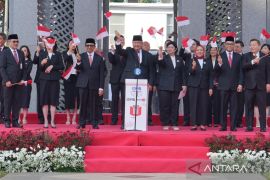The policy succeeded in reducing the impact of the global financial woes on the country`s balance of payments."Jakarta (ANTARA News) - Bank Indonesia said the country succeeded in cutting its balance of payment deficit to US$2.5 billion in the second quarter of this year from US%6.6 billion in the previous quarter.
Bank Indonesia Governor Agus Martowardojo attributed the decline to effective fiscal policies adopted by the central bank and the government.
"The policy succeeded in reducing the impact of the global financial woes on the country`s balance of payments," Agus said in a news release issued here on Monday.
Agus said surplus which was recorded again in capital and financial account after a big deficit in the previous quarter, resulted in significant decline in the balance of payment deficit.
On the other hand , normally the current account deficit rose in the second quarter compared with the previous quarter.
In line with the deficit in the balance of payments, the country`s foreign exchange reserves fell to US$98.1 billion by the end of June after reaching more than US$110 billion several months earlier.
The shrinking foreign exchange reserves, however, are still enough to finance imports and service the government`s foreign debts for 5.1 months or still well above the international adequacy standard.
Seasonal factor and falling prices of export commodities contributed to widening the current account deficit from US$5.8 billion or 2.6 percent of the country`s GDP in the first quarter to US$9.8 billion in the second quarter or 4.4 percent of the GDP.
The surge in the current account deficit was attributable to shrinking surplus in trade of commodities outside oil and gas and widening deficit in services and income accounts.
The surplus in trade of non oil/gas commodities shrank on a surge in imports especially imports of industrial basic materials and consumer goods .
Increase in domestic consumption has been normal in the second quarter compared with the first quarter every year.
Earning from the exports of commodities outside oil and gas has declined on falling price of major export commodities as a result of the Chinese and Indian slowdown.
Deficit in service account widened on increase in payment for the transport of growing import goods, and growing number of Indonesians traveling abroad in school holidays.
Deficit also widened in income account with the payments of interest on foreign debts and transfer of proceeds by foreign investors
Meanwhile, deficit has continued in oil and gas trade although declining compared with the first quarter.
In a bid to ward off the impact of the global financial turbulence , Bank Indonesia and the government have adopted fiscal policy and strategy which succeeded in creating surplus reaching US$8.2 billion in capital and financial account in the second quarter after a deficit of US$300 million in the first quarter.
The improvement in performance was partly attributable to growing inflows of foreign direct investment (FDI).
"This indicates strong confidence of foreign investors in the fundamental condition and Indonesian economic prospects," Agus said.
In addition, significant surplus was still recorded in foreign portfolio investment despite a surge in capital outflows in June 2013 after the US plan to stop relaxation of its monetary policy .
The improvement in the capital and financial account was also attributable to steps taken by the central bank keeping inflation under control by raising the FASBI (one week overnight rate given to commercial banks) and Bank Indonesia benchmark interest rate (BI Rate), steps by the government in issuing foreign exchange bonds as a source of financing fiscal deficit and an increase in corporate foreign exchange bonds, as well as surpluses in other investment especially in the form of withdrawal of savings abroad by domestic banks.
Banks have withdrawn part of their savings abroad to meet demand from their clients and to utilize saving facility in the form of foreign term deposit instrument and foreign exchange swap facility offered by Bank Indonesia.
"In the third quarter of 2013, improvement of global economy and financial condition and slowdown in domestic demand are expected to help restore Indonesia`s external balance," Agus said.
As has been a seasonal pattern , current account deficit in the third quarter in 2013 would be much lower than in the previous quarter, he said
In addition, the world`s economy and commodity prices are forecast to improve that would contribute to improvement in the country`s export performance, he said.
Slowdown in the domestic economic growth and rupiah volatility will curb acceleration of imports and reduce deficit inj service account, he added.
In the capital and financial account , significant surplus is still expected in the third quarter of this year. Despite slowdown in foreign investment , normally the value will increase in the third quarter compared with in the second quarter, he said.
The turbulence, which began to recede in the global financial market, will reduce outflows of foreign portfolio investment, which surged in June. In July, foreign capital began to flow in invested in state bonds and shares, he said (Uu.H-ASG/O001)
Editor: Priyambodo RH
Copyright © ANTARA 2013












